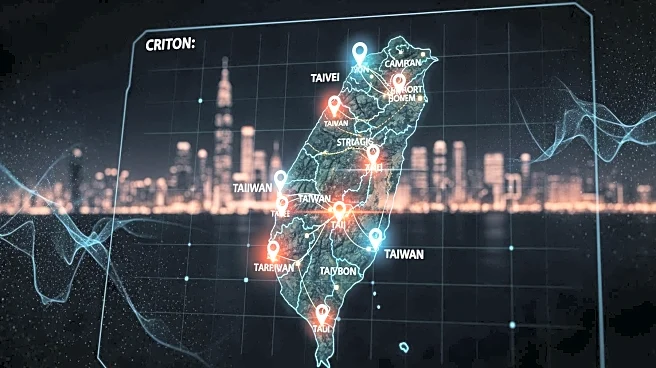What's Happening?
Taiwan is facing increasing military threats from China, prompting discussions on the island's defense capabilities. J Michael Cole, a commentator based in Taipei, highlights Taiwan's resilience despite
daily incursions into its air defense identification zone and missile tests by China. President William Lai has announced plans to increase defense spending to 5% of GDP and build an anti-missile shield, the 'T-dome.' Despite the threats, the mood in Taiwan remains calm, with citizens continuing their daily lives. Cole notes that while China's military capabilities have ramped up, including investments in missiles and landing craft, Taiwan's strategy focuses on deterrence rather than direct conflict.
Why It's Important?
The situation in Taiwan is critical for regional stability and global economic interests, particularly due to Taiwan's role in semiconductor production. China's military build-up poses a significant threat, but Taiwan's strategic focus on deterrence aims to impose high costs on potential aggressors. The island's defense spending and military preparedness are crucial in maintaining peace and preventing conflict. The geopolitical implications are vast, as any escalation could involve major powers like the U.S. and impact global trade and security. Taiwan's ability to withstand pressure from China is vital for maintaining its sovereignty and democratic values.
What's Next?
Taiwan plans to increase its defense budget and enhance its military capabilities, including the development of an anti-missile shield. The international community, particularly the U.S., may play a role in supporting Taiwan's defense efforts. Diplomatic engagements and alliances could be strengthened to deter Chinese aggression. The situation may lead to increased military presence and cooperation in the Indo-Pacific region, with potential implications for U.S.-China relations. Taiwan's strategic decisions will be closely monitored by global stakeholders, influencing future policy and security dynamics.
Beyond the Headlines
The intensifying threats from China highlight the broader geopolitical tensions in the Indo-Pacific region. Taiwan's defense strategy underscores the importance of deterrence and resilience in maintaining sovereignty. The situation raises ethical and legal questions about international intervention and the balance of power. Taiwan's role in the global economy, particularly in semiconductor production, adds complexity to the geopolitical landscape. The island's democratic values and identity are central to its resistance against Chinese coercion, reflecting broader themes of freedom and autonomy.











